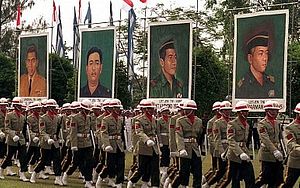Fifty years ago this week, one of the worst mass murders in Indonesia’s history got underway. On the evening of September 30, 1965 six military generals were killed as part of an alleged leftist uprising, providing Major General Suharto with the pretext to seize power and launch a nationwide “purge” of alleged communists and their sympathizers.
What followed was an unspeakably dark period in Indonesian history. Over the next two years, the Indonesian security forces and their proxy death squads unleashed a wave of terror targeting members of the communist party, trade unionists, academics, students, or anyone with suspected left-wing ties.
Anywhere between 500,000 and one million people were killed. Sexual violence was rampant with countless women raped or kept as sexual slaves. Hundreds of thousands of people were imprisoned without trial – many spent years in jail, suffering regular torture and forced labor. The killings marked the start of Suharto’s oppressive 32-year tenure as president, during which he ruled Indonesia through a military dominated government willing to use violence to carry out its will.
If you are surprised that you haven’t heard of these events before, you shouldn’t be. The 1965-1966 killings in Indonesia are one of the world’s most under-reported massacres. At the time of the events, there is overwhelming evidence that Western countries – gripped by Cold War anti-communist paranoia– suppressed information about the horror that was unfolding in Indonesia, and even actively backed Suharto.
In Indonesia, a chilling culture of silence has prevailed, where even discussing these issues can carry tangible risks. Almost none of the perpetrators have been brought to justice – many live in the communities they once terrorized, holding positions of local power and often bragging openly about their crimes. Many victims continue to live in fear and demands for truth and justice have by and large gone ignored by successive Indonesian governments since the return to democracy in 1998.
Pak Kusnendar is one of the survivors who is determined to ensure that the past is not swept under the carpet. In 1965, he was thrown in prison without trial because he was tenuously linked to a Communist youth organization. He would spend the next 12 years behind bars, where he suffered beatings, forced labor, and was on the brink of starvation due to a lack of food.
For the past eight years, Kusnendar and other survivors have gathered outside the Presidential Palace in Jakarta for an hour every week. They’re dressed in black and carry black umbrellas – a simple but powerful vigil to demand that the government take their demands for truth and justice seriously.
“I want the Indonesian people to know the truth from all sides. We want to show this country that the function of courts should not be to imprison victims and then release them without process. We simply ask that the government provide justice and truth,” he told Amnesty International.
There have been some notable efforts to get to the truth of what happened in 1965 and 1966. In July 2012, the Indonesian national human rights commission Komnas HAM published a devastating report that found evidence of crimes against humanity committed by the security forces. But despite urging the Attorney General’s office to act on its findings and launch investigations, nothing has happened yet. Meanwhile attempts to establish a truth commission on the national level have stalled due to a lack of political will.
In October 2014, Indonesia’s new President Joko “Jokowi” Widodo took office on the back of promises to prioritize human rights and to address crimes of the past. But so far, the hopes that this raised among victims and activists have been dashed. Widodo did recently announce a non-judicial mechanism to resolve past human rights abuses, including the events of 1965. But without powers to prosecute, there are serious concerns that this new mechanism will prioritize reconciliation over truth and justice, and let the perpetrators walk free. A lack of details has also left some serious questions unanswered on the committee’s independence and ability to protect witnesses.
Indonesia has come a long way on human rights over the past years, and is rightly emerging as a regional leader. But by sweeping its dark past under the carpet, it risks sowing the seeds of resentment and leaving millions of victims and family members to suffer. Fifty years is too long for anyone to wait for truth and justice. On this anniversary, the least the Indonesian authorities can do is to ensure that this wait is over soon.
Papang Hidayat is Amnesty International’s Indonesia Researcher.

































